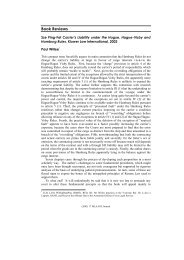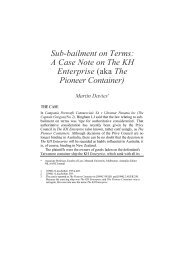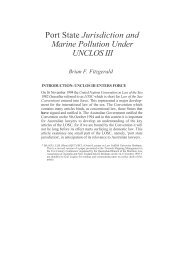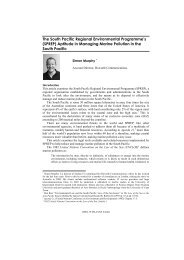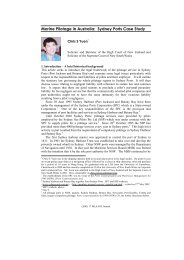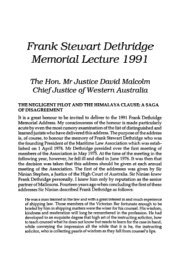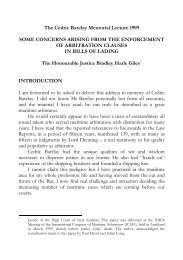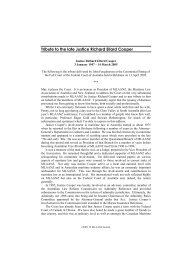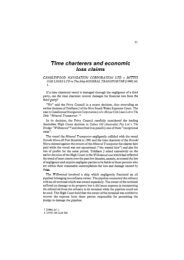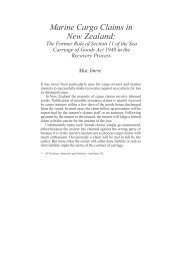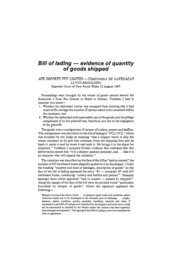Fixing or unfixing a charter party
Fixing or unfixing a charter party
Fixing or unfixing a charter party
Create successful ePaper yourself
Turn your PDF publications into a flip-book with our unique Google optimized e-Paper software.
<strong>Fixing</strong> <strong>or</strong> <strong>unfixing</strong> a <strong>charter</strong> <strong>party</strong><br />
Stuart Hetherington*<br />
This paper was <strong>or</strong>iginally delivered at the 1989 Annual Conference<br />
of MLAANZ held in Adelaide in October 1989.<br />
I. "COMMERCIAL JUSTICE AND STERILE LEGAL APPLICATION<br />
- 'THE TWAIN SHALL NEVER MEET'."<br />
Such was the lament of Ian Timmins in a letter to Fairplay<br />
magazine of 9 March 1989 when criticising the decision of Steyn J in<br />
the case of Start Steamship Society v Beogradska Plovidba (The Juni<strong>or</strong><br />
K). '<br />
The question f<strong>or</strong> the court's consideration was 'whether a binding<br />
contract f<strong>or</strong> the <strong>charter</strong> of the vessel had been entered into when the<br />
final telex communication between the brokers had stated, inter alia,<br />
"Confirm telcons here recap fixture sub details". The telex had then set<br />
out the terms which had been agreed and concluded with the w<strong>or</strong>ds<br />
"subdets Gencon CP".<br />
After that telex had been sent the defendant <strong>charter</strong>er had indicated<br />
that it did not wish to proceed with the negotiations. The plaintiffs,<br />
owners of the vessel, regarded that as a repudiation of the contract and<br />
claimed damages. They obtained leave to issue and serve proceedings<br />
out of the jurisdiction which the defendant then challenged. In <strong>or</strong>der to<br />
establish the right to serve out of the jurisdiction the plaintiffs needed<br />
to show that they had a good arguable case <strong>or</strong>, as Steyn J described it,<br />
a "realistic prospect of s~ccess".~ If he decided that the w<strong>or</strong>ds "subdets<br />
Gencon CP" showed that the parties did not intend to be bound<br />
immediately, it followed, he said, that the plaintiffs "have no good<br />
arguable case on the merits. The plaintiffs submit that the point is<br />
arguable; the defendants contend that the meaning of the expression is<br />
clear beyond any d~ubt".~<br />
* Partner, Ebsw<strong>or</strong>th and Ebsw<strong>or</strong>th, Sydney.<br />
I [l9881 2 Lloyd's Rep 583.<br />
See n1, 585.<br />
Ibid.
Charter parties 13<br />
In reaching his conclusion that no binding contract had come into<br />
existence he said:'<br />
On the other hand, in negotiations parties are free to stipulate that no binding<br />
contract shall come into existence, despite agreement on all essentials, until<br />
agreement is reached on yet unmentioned and unconsidered detailed provisions.<br />
And the law should respect such a stipulation in commercial negotiations. That<br />
seems to me to be exactly what happened in this case. The Gencon <strong>charter</strong>-<strong>party</strong><br />
is, of course, a detailed and well-known standard f<strong>or</strong>m. It is plain that the parties<br />
had in mind a contract on the Gencon f<strong>or</strong>m but that they had not yet considered<br />
the details of it. By the expression, "Subject to details of the Gencon <strong>charter</strong><br />
<strong>party</strong>" the owners made clear that they did not wish to commit themselves<br />
contractually until negotiations had taken place about the details of the <strong>charter</strong>-<br />
<strong>party</strong>. Such discussions might have covered a number of clauses. It does not<br />
follow that the owners were willing to accept all the detailed provisions of the<br />
standard f<strong>or</strong>m document. After all, it is a common occurrence f<strong>or</strong> some of the<br />
detailed provisions of the Gencon f<strong>or</strong>m to be amended during the process of<br />
negotiation. In any event, the Gencon standard f<strong>or</strong>m contains witThin it alternative<br />
provisions which require a positive selection of the desired alternative.<br />
He then referred to Box 16 on the first page of the Gencon Standard<br />
F<strong>or</strong>m which deals with the subject of laytime. That then refers to<br />
clause 6 which contains various options available to the parties. He<br />
referred to the fact that no discussion had taken place between the<br />
parties as to which of those options was to apply.<br />
In supp<strong>or</strong>t of his conclusion Steyn J referred to the decision of<br />
Staughton J in The SolholP in which he had made the following<br />
ob~ervation:~<br />
Also on July 27 further employment f<strong>or</strong> the vessel was arranged. She is described<br />
as having on that day been "fixed subject to details". That means that the main<br />
terms were agreed, but until the subsidiary terms and the details had also been<br />
agreed no contract existed.<br />
Steyn J also referred to the decision of Leggatt J in The Nissos<br />
Samos7 in which he had said:8<br />
"Subject details" is a well-known expression in broking practice which is intended<br />
to entitle either <strong>party</strong> to resile from the contract if in good faith either <strong>party</strong> is<br />
not satisfied with any of the details as discussed between them.<br />
Steyn J's interpretation of these remarks is that Leggatt J:9<br />
was not intending in the relevant passage to state any new principle of law.<br />
Reading his judgment in context it seems to me clear that in the relevant passage<br />
Leggatt J, in so far as he refers to the qualification of good faith, is simply<br />
rec<strong>or</strong>ding and stating a broking view as to the matter and not the strict legal<br />
position.<br />
The Nissos Samos was a case involving negotiation f<strong>or</strong> the sale of<br />
the vessel f<strong>or</strong> scrap and the question was^ whether there was a<br />
concluded contract on a particular date, which was April 23. On that<br />
See nl, 585-586.<br />
' [l9811 2 Lloyd's Rep 574.<br />
See n5, 576.<br />
' [l9851 1 Lloyd's Rep 378.<br />
q e e n7, 385.<br />
[l9881 2 Lloyd's Rep 589.
14 (1991) 8 MLAANZ Journal - Part 1<br />
day one of the parties had sent a telex which had used the w<strong>or</strong>ds<br />
"subject details". Leggatt J decided that there was no completed<br />
contract on that date but there was seven days later on 30 April.<br />
Timmins was not alone in his disappointment at the decision in The<br />
Juni<strong>or</strong> K. He was joined by Lee Turner, a broker from Calif<strong>or</strong>nia, USA,<br />
who also wrote to Fairplay magazine and said:<br />
The reason that fixtures are made 'subject c/p details' is that the latter can be<br />
excessively lengthy and require many days of negotiation in themselves. Not, as<br />
Mr Justice Steyn stated, "to make clear that there is no binding contract". Who<br />
would want to include all the c/p terms in the main trade if the two parties<br />
cannot get within shouting distance of each other on such basic matters as rate<br />
and dates? So we trade the basics first to see if there is common ground and then<br />
proceed to the <strong>charter</strong> <strong>party</strong> later. This is not because the principals do "not wish<br />
to commit contractually", as the learned Judge thinks - at least not if they are<br />
honest and ethical - but because the alternative is too unwieldy in most<br />
circumstances.<br />
The auth<strong>or</strong> went on to refer to some f<strong>or</strong>ms of <strong>charter</strong> parties in which<br />
the terms can all be agreed in the main trade. He referred to tanker<br />
<strong>charter</strong>s and grain <strong>charter</strong>s and suggested that this was because they<br />
were using documents which had been long established in the trade and<br />
were covering well known trades.<br />
That particular broker went on to suggest that the court has given<br />
sanction "to every unscrupulous <strong>charter</strong>er <strong>or</strong> owner who, having<br />
committed himself to the essentials of a fixture, seeks a bolt-hole out<br />
of it...". He also suggested that instead of using the w<strong>or</strong>ds "subject to<br />
c/p details", a w<strong>or</strong>ding such as "c/p details to be traded after<br />
conclusion of fixture on main terms" may now be m<strong>or</strong>e appropriate.<br />
The auth<strong>or</strong> considered those w<strong>or</strong>ds would make it clear "as to what the<br />
situation ought to be".<br />
11. THE UNITED STATES POSITION<br />
The American broker may have greater reason f<strong>or</strong> expressing his<br />
concern at the decision. The United States law on "sub details" can be<br />
seen in the decision of The United States Court of Appeals in Great<br />
Circle Lines Ltd v Matheson & CO Ltd (The Cluden).l0<br />
In that case the <strong>charter</strong>ers sued the owners f<strong>or</strong> wrongful withdrawal<br />
from an alleged <strong>charter</strong> <strong>party</strong> contract. The head note reads: "The<br />
Court of Appeals, Cardamone, Circuit Judge, held that fixture estab-<br />
lishing the main terms and agreeing to negotiate over details constitut-<br />
ed a meeting of the minds sufficient to supp<strong>or</strong>t f<strong>or</strong>mation of a <strong>charter</strong><br />
<strong>party</strong>".<br />
The facts were that on 24 October 1979 the parties had agreed on the<br />
name of the <strong>charter</strong>er, and its guarant<strong>or</strong>, a description of the Cluden's<br />
l0 681F2d121 (2d Circuit 1982).
Charter parties 15<br />
characteristics, time and place of delivery, duration of the <strong>charter</strong>,<br />
place of redelivery, trading exclusions (certain cargoes were f<strong>or</strong>bid-<br />
den), commissions, and the printed f<strong>or</strong>m NYPE 46. They also reached<br />
agreement on the hire rate.<br />
A telex confirming those matters included the w<strong>or</strong>ds: "so we fixed<br />
sub details".<br />
On 25 October 1979 the owners had sent a recap telex to the<br />
<strong>charter</strong>ers. This telex used the w<strong>or</strong>ds "subject to details NYPE 46".<br />
The <strong>charter</strong>ers telexed back with suggested amendments to NYPE.<br />
There were numerous changes to the standard clauses, which altered<br />
108 lines, and also 33 rider paragraphs were suggested as well as a<br />
proposal f<strong>or</strong> alterations to the terms agreed the previous day.<br />
On 26 October 1979 the owners accepted some of the <strong>charter</strong>er's<br />
suggested amendments to the f<strong>or</strong>m, rejected others and proposed New<br />
Y<strong>or</strong>k instead of London f<strong>or</strong> the arbitration site. The owners asked f<strong>or</strong> a<br />
reply by 2.30pm London time <strong>or</strong> 9.30am New Y<strong>or</strong>k time. Evidence was<br />
given by the <strong>charter</strong>er that the telex was not received until after<br />
9.30am. In the absence of a response the owner <strong>charter</strong>ed the vessel to<br />
a third <strong>party</strong>. The question f<strong>or</strong> the court's decision was whether <strong>or</strong> not<br />
the owners had wrongfully withdrawn from a concluded <strong>charter</strong> <strong>party</strong>.<br />
At both first instance and bef<strong>or</strong>e the US Court of Appeals it was held<br />
that the contract had been concluded.<br />
The judgment of the court referred to the general contract law<br />
principles which provide that "no contract exists when the parties fail<br />
to agree on all the essential terms <strong>or</strong> where some are too indefinite to<br />
be enf<strong>or</strong>ceable". The judgment also referred to the "long standing<br />
customs of the shipping industry" which needed to be considered "when<br />
deciding whether there has been a meeting of the minds on a maritime<br />
contract". The court stated:"<br />
The shipping industry is a fast moving and ever changing business, where dealings<br />
between the parties called "trade" are usually conducted with a sense of urgency<br />
under severe time constraints. To bring owners and <strong>charter</strong>ers together, it is the<br />
custom of the industry to deal through brokers who receive and send telex traffic<br />
all over the w<strong>or</strong>ld.<br />
Charter parties are f<strong>or</strong>med in two stages. First, significant 'main' terms are<br />
negotiated through brokers. These terms usually include the name of a <strong>charter</strong>er,<br />
name of owner, ship and its characteristics, time and place of delivery, duration<br />
of <strong>charter</strong>, place of re-delivery, hire rate, printed f<strong>or</strong>m upon which the contract is<br />
based, and any other term that a <strong>party</strong> deems imp<strong>or</strong>tant. These are considered<br />
the 'bare-bones' of the contract. The 'main' terms when agreed upon are entitled a<br />
'fixture'. Second, adter a 'fixture' has been reached, the parties continue to<br />
negotiate 'details' amending the f<strong>or</strong>m of contract specified in the 'fixture'. These<br />
min<strong>or</strong> <strong>or</strong> side issues 'flesh out' the <strong>or</strong>iginal agreement <strong>or</strong> fixture. The 'details'<br />
include a wide variety of matters, f<strong>or</strong> example: fuel used, speed of vessel,<br />
" See n10, 125.
16 (1991) 8 MLAANZ Journal - Part 1<br />
condition of ship's holds, exact times of ship's delivery to <strong>charter</strong>er, brokerage,<br />
breakdown, bunkering, option to extend <strong>charter</strong>, cargo capacity, demurrage and<br />
whatever else is deemed by the parties to be of min<strong>or</strong> imp<strong>or</strong>tance. The details are<br />
not meaningful of the trade in the same way as the main terms of the fixture, in<br />
as much as the fixture affects the trade directly and determines whether it will be<br />
a successful piece of business. Where no amendment of details is agreed upon,<br />
however, the terms of the printed f<strong>or</strong>m govern.<br />
The court rejected an argument that the phrase "subject to details"<br />
created a condition subsequent which, upon its failure, terminated the<br />
existence of the contract already f<strong>or</strong>med. It found that argument to be<br />
not persuasive. It regarded the identification of the NYPE 46 f<strong>or</strong>m as<br />
the "contract-saving mechanism" agreed to by the parties in the event<br />
that there was a failure to agree on the details.<br />
Somewhat surprisingly, the court also relied upon a statement in J<br />
Bes Chartering and Shipping Terms,12 which defines a "fixing letter" as<br />
a summary of the principal conditions of a <strong>charter</strong> <strong>party</strong>, in <strong>or</strong>der to<br />
reject the <strong>charter</strong>er's argument that owing to its London situs its<br />
understanding of the terminology in use in the industry was different to<br />
that found by the trial court.<br />
The <strong>charter</strong>ers theref<strong>or</strong>e succeeded in f<strong>or</strong>cing the owners to arbi-<br />
trate even though in English law neither the fixture n<strong>or</strong> the arbitration<br />
clause would necessarily have been binding.<br />
111. REQUIREMENTS OF ENGLISH/AUSTRALIAN LAW<br />
C Debattista, in an article in the Lloyd's Maritime & Commercial<br />
Law Quarterly3 criticises this decision as it creates considerable<br />
uncertainty in seeking to classify certain terms as "main terms" on the<br />
one hand and as "details" on the other. He points out that "bunkering"<br />
which appears in the court's catalogue of "details" is described as a<br />
condition in the Bimco "Recommended Principles f<strong>or</strong> the Use of<br />
Parties Engaged in Chartering and Ships Agency Procedures". These<br />
were adopted in 1969 as an attempt to solve a problem caused by<br />
fixtures which are made "subject to details".<br />
In another article S N Ball concluded a discussion of the American<br />
decisions on this subject by suggesting that it was:"<br />
unlikely that such decisions would be regarded as acceptable here. Their reason-<br />
ing is based on unfounded assumptions about the intentions of the parties and they<br />
adopt an unacceptably narrow view of what is essential in a <strong>charter</strong>-<strong>party</strong>. They<br />
are also decisions taken very much on the facts of individual cases, which reflect<br />
the commercial hist<strong>or</strong>y of each bargain.<br />
It is the purpose of the remainder of this paper to consider whether<br />
the quote at the beginning of this paper is justified and whether English<br />
(9 ed, 1975) 45.<br />
I' [l9851 LMCLQ 241.<br />
l' [l9841 LMCLQ 250, 253.
Charter parties 17<br />
law in this area does in fact seek to meet the commercial expectations<br />
of its customers. It is possible to demonstrate that courts are prepared<br />
to hold parties to their arrangements even where they have not,<br />
strictly, agreed on all the terms of their contract. This is clearly an<br />
imp<strong>or</strong>tant area of concern f<strong>or</strong> those at the coalface negotiating<br />
commercial contracts, such as shipbrokers, who are required to<br />
conclude complex commercial contracts involving a myriad of factual<br />
circumstances. As Timmins also said in his letter to Fairplay<br />
Commercial efficacy in this modern w<strong>or</strong>ld of instant communications, time<br />
differences and spot vessels, necessitates fixtures being concluded out of office<br />
hours and during holidays, with main terms negotiations usually concerning any<br />
'nasties' so that the actual details become secondary to the main terms.<br />
The principal restraint which the law imposes in this area is the<br />
basic requirement f<strong>or</strong> certainty in commercial transactions. An exam-<br />
ple of the law's requirement is well stated in Treitel The Law of<br />
C~ntracfi'~<br />
An agreement is not a binding contract if it lacks certainty, either because it is<br />
too vague <strong>or</strong> because it is obviously incomplete.<br />
The classic case in this area of the law is that of G Scammell and<br />
Nephew Ltd v Ouston16 in which the House of L<strong>or</strong>ds held that an<br />
agreement to buy goods "on hire-purchase" was too vague to be<br />
enf<strong>or</strong>ced, since there were many kinds of hire-purchase agreements in<br />
widely different terms and it was impossible to say on which terms the<br />
parties intended to contract. Viscount Maugham said in that case: "In<br />
<strong>or</strong>der to constitute a valid contract the parties must so express<br />
themselves that their meaning can be determined with a reasonable<br />
degree of certainty"." In another part of his judgment he said:'"<br />
In commercial documents connected with dealings in a trade with which the<br />
parties are perfectly familiar the court is very willing, if satisfied that the parties<br />
thought that they made a binding contract, to imply terms and in particular terms<br />
as to the method of carrying out the contract which it would be impossible to<br />
supply in other kinds of contract.<br />
Other examples of agreements which have been held to be too vague<br />
to be enf<strong>or</strong>ceable are those which have contained descriptions such as<br />
"subject to war clause", "subject to strike and lock-out clause", and<br />
"subject to f<strong>or</strong>ce majeure conditions".<br />
That is the general rule which, if given full f<strong>or</strong>ce and effect by the<br />
law would strike down agreements which the parties otherwise intend-<br />
ed to have commercial effect. Such examples do tend to supp<strong>or</strong>t the<br />
fears of the commercial community. There are numerous ways,<br />
however, by which the court would seek to give effect to commercial<br />
" (7 ed, Stevens & Sons, London, 1987) 40.<br />
" [l9411 AC 251.<br />
l' See n16, 255.<br />
Ibid.
18 (1991) 8 MLAANZ Journal - Part 1<br />
documents even though they may be vague and uncertain in some<br />
respects.<br />
A. Custom<br />
The courts can resolve some vagueness by applying custom. One<br />
examplelP was a contract to load coal at Grimsby "on the terms of the<br />
usual colliery guarantee". Such an agreement was upheld on proof of<br />
the terms usually contained in such guarantees at Grimsby.<br />
B. Implication of Reasonableness<br />
Another example of a case in which the court came to the rescue of<br />
parties was in Hillas & CO Ltd v Arcos Lt8O where the parties had<br />
made an agreement f<strong>or</strong> sale of timber "of fair specification" that had<br />
involved a contract f<strong>or</strong> the sale of 22,000 standards of softwood goods<br />
f<strong>or</strong> the 1930 season. The contract also provided that: "Buyers shall also<br />
have the option of entering into a contract with sellers f<strong>or</strong> the purchase<br />
of 100,000 standards f<strong>or</strong> delivery during 1931. Such contract to stipu-<br />
late that, whatever the conditions are, buyers shall obtain the goods on<br />
conditions and at prices which show to them a reduction of 5% on the<br />
F.O.B. value of the official price list at any time ruling during 1931".<br />
When the plaintiff sought to exercise that option the defendant pur-<br />
p<strong>or</strong>ted to cancel the contract. As the contract had been made between<br />
persons who were well acquainted with the timber trade the court<br />
applied the standard of reasonableness in giving certainty to a vague<br />
phrase.<br />
The court found that there was sufficient evidence to prove that the<br />
parties had made a contract and not merely agreed to make a contract<br />
in the future.<br />
L<strong>or</strong>d Wright said as follows:z1<br />
Businessmen often rec<strong>or</strong>d the most imp<strong>or</strong>tant agreements in crude and summary<br />
fashion; modes of expression sufficient and clear to them in the course of their<br />
business may appear to those unfamiliar with the business far from complete <strong>or</strong><br />
precise. It is acc<strong>or</strong>dingly the duty of the court to construe such documents fairly<br />
and broadly, without being too astute <strong>or</strong> subtle in finding defects; but, on the<br />
contrary, the court should seek to apply the old maxim of English law, verba ita<br />
sunt intelligenda ut res magis valeat quam pereat.<br />
In an article in the Law Quarterly Re~iew2~ G H L Fridman<br />
commented upon this decision as follows:2a<br />
In effect, however, as the language of L<strong>or</strong>d Wright indicates, this maxim does not<br />
really state a principle of law so much as what might be called a general<br />
directive to be followed whenever the express language of the parties permits. All<br />
Shamrock SS CO v St<strong>or</strong>ey & CO (1899) 81 LT 413.<br />
'O (1932) 147 LT 503.<br />
See n20, 514.<br />
(1960) 76 LQR 521.<br />
See n22, 523.
Charter parties 19<br />
it does is to put succinctly the desire of the courts to assist the survival of the<br />
intention to contract in spite of the atmosphere of uncertainty which the language<br />
of the parties is alleged to have created. Matters must be so balanced that<br />
"without violation of essential principle, the dealings of men may as far as<br />
possible be treated as effective, and that the law may not incur the reproach of<br />
being the destroyer of bargains". (L<strong>or</strong>d Tomlin in Hillas & CO Ltd v Arcos Ltd.)<br />
The auth<strong>or</strong> then went on to discuss the choice which courts face<br />
between the application of the maxim <strong>or</strong> idea of validation and the<br />
application of the principle that courts do not construct contracts.<br />
Another well-known decision is that of Nicolene Ltd v SimmondsP4<br />
where steel bars had been bought on terms which were certain except<br />
f<strong>or</strong> a clause that the sale was subject to "the usual conditions of<br />
acceptance". There were, in fact, no usual conditions of acceptance<br />
and it was held that the phrase was meaningless. The Court however<br />
took the course of severing and ign<strong>or</strong>ing those w<strong>or</strong>ds and thus not<br />
vitiating the whole contract. This raises the difficulty as to whether <strong>or</strong><br />
not the disputed clause can be described as meaningless, as in that<br />
case, <strong>or</strong> is suggestive of the fact that there is still an essential term to<br />
be agreed between the parties bef<strong>or</strong>e they could be said to have<br />
entered into a binding agreement.<br />
The auth<strong>or</strong>s of Time Charted5 refer to the case of F & G Sykes<br />
(Wessex) v Fine Fare Ltd.26 In that case a national supermarket chain<br />
were to be supplied with chickens by the plaintiff. The supermarket<br />
chain withdrew from the contract two years after it had been made<br />
and in defence of the claim f<strong>or</strong> damages it asserted that there was no<br />
contract f<strong>or</strong> the reason that, although the parties had agreed on the<br />
number of chickens to be supplied during the first year of the contract,<br />
the contract had provided in relation to the four subsequent years that<br />
the plaintiff would deliver "such other figures as may be agreed<br />
between the parties hereto". The Court of Appeal held f<strong>or</strong> the plain-<br />
tiffs. In the w<strong>or</strong>ds of L<strong>or</strong>d Denning M R:27<br />
In a commercial agreement the further the parties have gone on with their<br />
contract, the m<strong>or</strong>e ready are the Courts to imply any reasonable term so as to<br />
give effect to their intention. When much has been done, the Courts will do their<br />
best not to destroy the bargain. When nothing has been done, it is easier to say<br />
there is no agreement between the parties because the essential terms have not<br />
been agreed. But when an agreement has been acted upon and the parties, as here,<br />
have been put to great expense in implementing it, we ought to imply all<br />
reasonable terms so as to avoid any uncertainties. In this case there is less<br />
difficulty than in others because there is an arbitration clause which, liberally<br />
construed, is sufficient to resolve any uncertainties which the parties have left.<br />
-<br />
[l9531 QB 543.<br />
Wilf<strong>or</strong>d, Coghlin, Healy & Kimball Time Charters (2 ed, Lloyd's Press, London, 1982).<br />
" [l9671 1 Lloyd's Rep 53.<br />
" See n26, 57-58.
C. Implication of Terms<br />
(1991) 8 MLAANZ Journal - Part 1<br />
This also leads to the situation in which the courts will imply terms in<br />
<strong>or</strong>der to give business efficacy to an agreement. A classic case in that<br />
regard is The Mo<strong>or</strong>~ock.~~ In that case the plaintiff's vessel had<br />
suffered damage when lying at the defendants' jetty. The defendants<br />
had agreed to allow the plaintiff to discharge and load the vessel at<br />
their wharf and f<strong>or</strong> that purpose to be mo<strong>or</strong>ed alongside the jetty.<br />
During low tide the vessel, as the parties contemplated, rested on the<br />
mud at the bottom of the River Thames. Damage to the vessel was<br />
found to have been occasioned by a ridge of hard ground beneath the<br />
mud and the plaintiff claimed compensation. The Court of Appeal said<br />
that a term had to be implied into the contract imposing an obligation<br />
on the defendants to see that the bottom of the river was reasonably<br />
fit, <strong>or</strong> to exercise reasonable care in finding out its condition, and to<br />
advise the plaintiff of its condition. Bowen L J said:2g<br />
In business transactions such as this, what the law desires to effect by the<br />
implication is to give such business efficacy to the transaction as must have been<br />
intended at all events by both parties who are businessmen; not to impose on one<br />
side all the perils of the transaction, <strong>or</strong> to emancipate one side from all the<br />
chances of failure, but to make each <strong>party</strong> promise in law as much, at all events,<br />
as it must have been in the contemplation of both parties that he should be<br />
responsible f<strong>or</strong> in respect of these perils <strong>or</strong> chances.<br />
The leading Australian auth<strong>or</strong>ity in this area is Codelfa Construction<br />
Pty Limited v State Rail Auth<strong>or</strong>ity of New South Wales3@ The High<br />
Court refused to imply a term into a construction contract because it<br />
was impossible to say, with any degree of certainty, what the term<br />
would have been. The parties had contracted under the misapprehension<br />
that construction w<strong>or</strong>k could proceed on a three shifts per day<br />
basis. An injunction obtained by local residents made this impossible<br />
but it was by no means clear what term the parties would have<br />
included to deal with the eventuality. The difficulty which the courts<br />
face in this regard was described in the following way by Mason J (as<br />
he then was):31<br />
F<strong>or</strong> obvious reasons the courts are slow to imply a term. In many cases, what the<br />
parties have actually agreed upon represents the totality of their willingness to<br />
agree; each may be prepared to take his chance in relation to an eventuality f<strong>or</strong><br />
which no provision is made. The m<strong>or</strong>e detailed and comprehensive the contract<br />
the less ground there is f<strong>or</strong> supposing that the parties have failed to address their<br />
minds to the question at issue. And then there is the difficulty of identifying with<br />
any degree of certainty the term which the parties would have settled upon had<br />
they considered the question.<br />
The degree of incompleteness of an agreement will be of critical<br />
imp<strong>or</strong>tance. If imp<strong>or</strong>tant questions have been left resolved then the<br />
" (1889) 14 PD 64.<br />
See n28, 68.<br />
'O (1982) 149 CLR 337,<br />
" See n30, 346.
Charter parties 21<br />
court will not hold the parties to a binding agreement. An example is<br />
where a lease fails to specify the date on which the term is to<br />
commence.32 If however the agreement expressly requires further<br />
agreement to be reached on points which have been left open then the<br />
court is given less room to move. As is well known agreements f<strong>or</strong> the<br />
sale of land are usually made "subject to contract".<br />
There are also examples of cases in which the parties have inc<strong>or</strong>po-<br />
rated a provision which requires further agreement at some later<br />
stage in relation to some aspect of the agreement. A good example is<br />
Foley v Classique Coaches Ltd.3S In that case the plaintiff owned a<br />
petrol-filling station and adjoining land. He sold the land to the<br />
defendant on condition that they should enter into an agreement to buy<br />
petrol f<strong>or</strong> the purpose of their mot<strong>or</strong> coach business exclusively from<br />
him. That agreement was duly executed but was broken by the<br />
defendant who then argued that the agreement was incomplete be-<br />
cause it had provided that the petrol should be bought "at a price<br />
agreed by the parties from time to time". The Court of Appeal rejected<br />
that argument and held that in default of agreement a reasonable<br />
price must be paid.<br />
Another area is the situation in which the courts have been prepared<br />
to find that there was a "contract to make a contract". Such agree-<br />
ments are binding. It may f<strong>or</strong> instance be agreed between parties that<br />
they will execute a f<strong>or</strong>mal document inc<strong>or</strong>p<strong>or</strong>ating terms on which<br />
they have previously agreed. In M<strong>or</strong>ton v M<strong>or</strong>tonJ4 the parties agreed<br />
"to enter into a separation deed containing the following clauses" and<br />
then a summary was given of those clauses. That was held to be a<br />
binding contract. Once again there is a narrow line to be drawn<br />
between such agreements and mere agreements to negotiate which are<br />
too uncertain to be given binding f<strong>or</strong>ce.<br />
D. Ship Sale Contracts<br />
In the shipping context the case of The Intra Transp<strong>or</strong>teP5 is an<br />
example of an instance where the sale of a ship and a <strong>charter</strong> <strong>party</strong><br />
"subject to details" was held not to be binding bef<strong>or</strong>e the details had<br />
been settled. In that case negotiations had been conducted during<br />
February and March 1983 f<strong>or</strong> the <strong>charter</strong> of the defendant's vessel f<strong>or</strong><br />
carriage of a cargo of about 10,000 tons of steel reinf<strong>or</strong>cing bars from<br />
Puerto Acevedo to Dubai. Leggatt J referred at the commencement of<br />
his judgment to the fact that "on any view the parties reached an<br />
advanced stage in the negotiations, such that there was a f<strong>or</strong>m of<br />
It See Harvey v Pratt [l9651 1 WLR 1025.<br />
l' [l9341 2 KB 1.<br />
" [l9421 1 All ER 273.<br />
3"1985] 2 Lloyd's Rep 159.
22 (1991) 8 MLAANZ Journal - Part 1<br />
<strong>charter</strong> <strong>party</strong> signed on behalf of the plaintiffs by Global, pursuant to<br />
- -<br />
an auth<strong>or</strong>ity which they claimed to have possessed. The question is<br />
whether the parties in fact made a binding contract".<br />
The competing arguments were described by Leggatt J as follows:36<br />
The plaintiffs contend that there was no point by which the negotiation was, <strong>or</strong><br />
appeared to have been, concluded. The parties did no m<strong>or</strong>e than clarify the salient<br />
terms on which they expected to be able to enter into a <strong>charter</strong>-<strong>party</strong>. The<br />
defendants, on the other hand, say that there are at least two alternative points at<br />
which a concluded agreement can be discerned, irrespective of whether the<br />
negotiating parties realised it.<br />
The judgment recounts in considerable detail all the telex exchanges<br />
between the brokers acting f<strong>or</strong> the two principals. Leggatt J found that<br />
an agreement had not been reached by the date upon which it was<br />
asserted by the defendants that a binding agreement had been<br />
reached?'<br />
It may well be that the terms were all w<strong>or</strong>ked out, but, as Mr Kopiski's telex<br />
message implied, that <strong>charter</strong>-<strong>party</strong> was not intended to be binding until it was<br />
signed. Until it was, there was opp<strong>or</strong>tunity f<strong>or</strong> further negotiations. In particular,<br />
the plaintiffs did not want to be committed to the defendants until they had<br />
concluded their sale contract with Al-Shirawi. That is why the telex messages of<br />
Mar 7,1983, concentrated on resolving the one issue then live between the parties,<br />
but made no mention of the <strong>charter</strong>-<strong>party</strong> having, at that point, become binding,<br />
because it had not. Hence Mr Kopiski still regarded himself as being free to<br />
arrange f<strong>or</strong> provisions to be inserted in the <strong>charter</strong>-<strong>party</strong>, which would match the<br />
requirements of the letter of credit to be furnished by Al-Shirawi.<br />
In effect what Leggatt J found in that case was that the parties had<br />
implicitly agreed that the <strong>charter</strong> <strong>party</strong> would not be binding until<br />
such time as the commercial sale contract had been concluded and the<br />
two documents married together. He concluded his judgment by<br />
It looks as though, when the sale to Al-Shirawi fell through and the plaintiffs<br />
withdrew from the <strong>charter</strong>-<strong>party</strong>, Mr Phillips was left averring that he did not see<br />
any outstanding points and that theref<strong>or</strong>e the vessel was fully fixed. Unf<strong>or</strong>tunate-<br />
ly, f<strong>or</strong> the reasons I have given, the fixture had eluded him, which had so nearly<br />
been within his grasp.<br />
Another example of a case requiring f<strong>or</strong>mal signature bef<strong>or</strong>e a<br />
binding contract had been entered into, in a shipping context, is that of<br />
Okura & CO Ltd v Navara Shipping C<strong>or</strong>p S A.39 In that case a contract<br />
had been entered into f<strong>or</strong> construction and sale of a ship. However,<br />
delays in its building entitled the purchaser to cancel the contract,<br />
which it did. Negotiations then recommended. At first instance Neill J<br />
had held that a binding agreement had come into existence at a point<br />
of time at which all essential terms had been agreed. He found that<br />
although a written mem<strong>or</strong>andum rec<strong>or</strong>ding the terms was no doubt<br />
necessary, the signing of the mem<strong>or</strong>andum of agreement was not a<br />
" Ibid.<br />
See n35, 163.<br />
m See n35, 164.<br />
l9 [l9821 2 Lloyd's Rep 537.
Charter parties 23<br />
condition precedent to the f<strong>or</strong>mation of a binding contract. He found in<br />
favour of the purchaser on the basis that the builder had subsequently<br />
repudiated that agreement. In the Court of Appeal their L<strong>or</strong>dships<br />
found that there had not been a concluded agreement at the time when<br />
Neill J had held there was such an agreement. As L<strong>or</strong>d Denning M R<br />
Everything was provisional only. The parties were not to be bound unless and<br />
until they signed an agreement ... Item 11 of the telex clearly contemplated that<br />
there should be a mem<strong>or</strong>andum of agreement in mutually acceptable terms ... The<br />
telex itself was not binding. It was a preliminary to a future document which was<br />
to be binding when signed. The future document was drafted but it was never<br />
signed. It was never agreed by the parties.<br />
A different approach was, however, taken in the case of Damon<br />
Compania Naviera S A v Hapag-Lloyd International S A." Hapag-<br />
Lloyd had decided to sell three of its vessels. Two brokers negotiated<br />
the sale and purchase to the stage at which the arbitrat<strong>or</strong> was satisfied<br />
that both the brokers, who were experienced men, "were convinced<br />
that they had a concluded a valid sale contract between their respec-<br />
tive principals and all that remained was the perf<strong>or</strong>mance by the<br />
sellers and the respondents of their respective obligations".<br />
There then followed some further exchanges of telexes to enable the<br />
completion of a mem<strong>or</strong>andum of agreement. Delay was experienced<br />
whilst the purchasers decided which entity they were to use as the<br />
purchasing company. A mem<strong>or</strong>andum of agreement, as drafted by<br />
Hapag-Lloyd's broker, was in the N<strong>or</strong>wegian sale f<strong>or</strong>m and provided in<br />
Clause 2 f<strong>or</strong> the payment of a deposit of 10% on signing the contract.<br />
Clause 13 went on to provide that in the event that the purchase money<br />
was not paid on delivery the sellers would have the right to cancel and<br />
the deposit would be f<strong>or</strong>feited. The mem<strong>or</strong>andum was never signed by<br />
the purchasers <strong>or</strong> any company on their behalf. There were further<br />
communications in which the buyers regretted the delay in signing the<br />
mem<strong>or</strong>andum but referred to unf<strong>or</strong>eseen complications with bankers.<br />
There was also a communication in which the purchasing company<br />
was identified and the vend<strong>or</strong>'s broker was requested to send a fresh<br />
mem<strong>or</strong>andum of agreement identifying the new purchasing company,<br />
Messrs Damon Compania Naviera S A. Once again, the purchasers<br />
failed to conclude the agreement <strong>or</strong> pay the deposit and Hapag-Lloyd<br />
withdrew from the contract and reserved its right to claim<br />
compensation.<br />
Fox L J, with whom Stephenson L J agreed, said:42<br />
But I see nothing in the present case to lead me to the conclusion that the parties<br />
contemplated the execution of the mem<strong>or</strong>andum of agreement as a pre-requisite<br />
[l9821 2 Lloyd's Rep 541.<br />
[l9851 1 Lloyd's Rep 93.<br />
'I See n41. 97-98.
(1991) 8 MLAANZ Journal - Part 1<br />
to the conclusion of a contract. That they contemplated and indeed agreed upon<br />
the execution of a written mem<strong>or</strong>andum I accept. But that, of itself, is not<br />
conclusive. It is open to parties to agree to execute a f<strong>or</strong>mal document inc<strong>or</strong>po-<br />
rating terms which they have previously agreed. That is a binding contract. In the<br />
present case, on July 8 all the terms of the sale were agreed. And it seems to me<br />
that all the indications are that they were not intended to be subject to the<br />
execution of the mem<strong>or</strong>andum. Thus the arbitrat<strong>or</strong> found (i) that the agreement<br />
was without any "subjects"; (ii) that the two experienced brokers, Mr. Panas and<br />
Mr. Nebelsiek. were convinced that thev had concluded a valid contract between<br />
their principals; and (iii) the agreementwould be regarded in the shipping market<br />
as a binding contract not requiring a signed mem<strong>or</strong>andum to validate it.<br />
It had also been argued by the purchaser that as it had failed to pay<br />
the deposit that prevented any contract of sale from coming into<br />
existence at all because the payment of the deposit was a condition<br />
precedent to the f<strong>or</strong>mation of the contract. This argument was also<br />
unsuccessful although there were precedents in relation to contracts<br />
relating to the sale of land which supp<strong>or</strong>ted the argument. Fox L J<br />
con~luded:'~<br />
I see no reason f<strong>or</strong> inferring that no contract arises until the deposit is paid. The<br />
provision f<strong>or</strong> the payment of the deposit is simply a term of the contract. In the<br />
absence of special provision it does not seem to me to carry with it any<br />
implication that it is a condition precedent to the existence of contractual<br />
relations.<br />
There is theref<strong>or</strong>e an alternative possibility that a document is<br />
intended only as a solemn rec<strong>or</strong>d of an already complete and binding<br />
agreement. This is an example which is well known to those involved<br />
in the insurance area where a contract of insurance is generally<br />
regarded as completed when the insurer initials a slip even though the<br />
execution of a f<strong>or</strong>mal policy document is contemplated.<br />
It is w<strong>or</strong>th noting that section 37(1) of the Marine Insurance Act 1909<br />
provides legislative assistance in the marine insurance area where a<br />
contract of marine insurance has not been concluded by fixing a<br />
premium. That subsection provides: "(1) Where an insurance is effected<br />
at a premium to be arranged, and no arrangement is made, a<br />
reasonable premium is payable."<br />
E, Chartering Cases<br />
It is of note that in Shipbroking and Chartering Pra~tice'~ by R Ihre,<br />
L G<strong>or</strong>ton and A Sandevarn, the auth<strong>or</strong>s say, in relation to fixtures<br />
which are made "subject to details":<br />
Technically, the parties are now regarded as committed to the <strong>charter</strong> (even if a<br />
<strong>party</strong> f<strong>or</strong>mally may still have the right to 'jump off' during the following<br />
discussions regarding the details of the <strong>charter</strong> <strong>party</strong> - <strong>or</strong> if insurmountable<br />
obstacles appear relating to any subjects) ... One should not, however, use details<br />
of the <strong>charter</strong> <strong>party</strong> as an excuse to break off the negotiations if the real reason is<br />
something else.<br />
pp<br />
'= [l9851 1 Lloyd's Rep 99.<br />
(2 ed, Lloyd's Press, London, 1984).
Charter parties 2 5<br />
In The Samahks Parker J held that there was a binding <strong>charter</strong> <strong>party</strong><br />
on which the owners could be sued. This was, however, on the basis<br />
that the agent of the <strong>charter</strong>er had put his signature to a time <strong>charter</strong><br />
<strong>party</strong> with the ostensible auth<strong>or</strong>ity of his principal. Parker J did not,<br />
however, accept the argument put f<strong>or</strong>ward by-the plaintiff that the<br />
language of the negotiating telexes was the language of firm offer and<br />
firm acceptance and that both parties regarded the two vessels being<br />
<strong>charter</strong>ed as being fixed. One of the telexes had stated "subject to<br />
satisfact<strong>or</strong>y modifications of vessels to be approved by <strong>charter</strong>ers"<br />
and "modification to be discussed with ownerw.-The owners had argued<br />
that although there were certain details to be agreed there had been<br />
sufficient already agreed to constitute an enf<strong>or</strong>ceable agreement and<br />
that the law could fill any gaps. The defendant had argued successfully<br />
that there was clearly no intention at that stage to contract and that<br />
even if there was there was insufficient certainty f<strong>or</strong> an enf<strong>or</strong>ceable<br />
contract to arise. In finding on that issue f<strong>or</strong> the <strong>charter</strong>er Parker J<br />
had said, in commenting on the telex negotiations:'"<br />
At this time very little was known at all about the proposed modification. The<br />
telex specifically provides that the details are to be agreed and that the<br />
modification of plans, other than the water ballast tanks, is to be discussed with<br />
the owners. The owners had not then seen the <strong>charter</strong>ers' pro f<strong>or</strong>ma. It is<br />
undoubtedly possible to contract when much is left outstanding and f<strong>or</strong> a <strong>party</strong> to<br />
commit himself to the acceptance of certain conditions which he has not seen. The<br />
present case is, however, not one of certain matters merely being left unmen-<br />
tioned. The parties have specifically stated that the details of the main modifica-<br />
tions are to be agreed and the possible modification of other tanks is to be<br />
discussed. Furtherm<strong>or</strong>e, when Hellenic Seaways Overseas C<strong>or</strong>p<strong>or</strong>ation, the agents<br />
in Piraeus f<strong>or</strong>.the plaintiffs, sent f<strong>or</strong>ward to Mr Maris the pro f<strong>or</strong>ma <strong>charter</strong>-<br />
<strong>party</strong>, they stated: ... You can add <strong>or</strong> alter clauses considering the special trading<br />
in which above mentioned vessels will be employed.<br />
This recognises that the fixture was an unusual one f<strong>or</strong> which special clauses<br />
would be required, as indeed they ultimately were. Mr Rokison submits that the<br />
introduction of the special clauses later was merely a variation of an already<br />
binding fixture on the terms of the <strong>charter</strong>ers' NYPE pro f<strong>or</strong>ma. But I cannot<br />
accept this. The reality of the situation is that both parties recognised that special<br />
provisions would have to be made. The <strong>charter</strong>ers indeed set about drafting them.<br />
In my judgment neither <strong>party</strong> intended the final telexes to constitute a binding<br />
contract and neither <strong>party</strong> considered at the time that they had done so.<br />
Furtherm<strong>or</strong>e, even if they had so intended <strong>or</strong> considered, they would not have<br />
succeeded. The parties having expressly stated that certain further matters were<br />
to be agreed <strong>or</strong> discussed, the Court cannot fill the gap.<br />
Another case of interest is the decision of Mustill J (as he then was)<br />
in The Wave.'l The owners had asserted in that case that there was no<br />
concluded <strong>charter</strong> as various matters had yet to be agreed. In particu-<br />
[l9811 1 Lloyd's Rep 40.<br />
See n45,42.<br />
[l9811 1 Lloyd's Rep 521.
26 (1991) 8 MLAANZ Journal - Part 1<br />
lar, they referred to the following matters which had not been the<br />
subject of agreement:<br />
(1) The identity of the <strong>charter</strong>ers;<br />
(2) The identity of the cargoes to be excluded;<br />
(3) The vessel's warranted fuel consumption; and<br />
(4) The rate at which the <strong>charter</strong>ers were to pay f<strong>or</strong> overtime.<br />
Once again this was a case involving the ostensible auth<strong>or</strong>ity of an<br />
agent. At the trial the defendants did not appear. The defence had<br />
asserted that there was no concluded contract and the basis f<strong>or</strong> that<br />
assertion was brought to the court's attention by the plaintiff's counsel<br />
as they had been asserted in certain pre-trial exchanges.<br />
Having reviewed the negotiations, Mustill J found that as a matter<br />
of fact all of these matters had been settled with a sufficient degree of<br />
certainty f<strong>or</strong> there to be a contract.<br />
IV. CONCLUSION<br />
Whilst American and English law has a divergence of approach in<br />
interpreting the w<strong>or</strong>ds "subject to details", parties to contracts involv-<br />
ing an American element <strong>or</strong> m<strong>or</strong>e particularly an arbitration clause<br />
calling f<strong>or</strong> arbitration in New Y<strong>or</strong>k need to be aware of this difference<br />
in approach.<br />
As has been seen there have been cases in the English courts in<br />
recent years in which the courts appear to be m<strong>or</strong>e flexible in holding<br />
parties to their bargains notwithstanding some unresolved matters.<br />
Another example is Pagnan v Feed Products Limitecru where the<br />
English Court of Appeal upheld a decision of Bingham J, who held that<br />
the parties had made a mutually binding contract f<strong>or</strong> the sale and<br />
purchase of c<strong>or</strong>n gluten feed pellets although agreement had not been<br />
reached on loading rate, demurrage and despatch and carrying<br />
charges. The court found that although the buyers and sellers expected<br />
terms to be put f<strong>or</strong>ward f<strong>or</strong> agreement, neither <strong>party</strong> intended express<br />
agreement on those terms to be a pre-condition of any concluded<br />
contract. Bingham J held that the parties intended to bind themselves<br />
on the terms agreed whilst leaving certain subsidiary and legally<br />
inessential terms to be settled later. In his judgment Bingham J made<br />
the following comment^:'^<br />
Where the parties have not reached agreement on terms which they regard as<br />
essential to a binding agreement, it naturally follows that there can be no binding<br />
agreement until they do agree on those terms. But just as it is open to parties by<br />
their w<strong>or</strong>ds and conduct to make clear that they do not intend to be bound until<br />
certain terms are agreed, even if those terms (objectively viewed) are of<br />
relatively min<strong>or</strong> significance, the converse is also true. The parties may be their<br />
a [l9871 2 Lloyd's Rep 601.<br />
See n48, 611.
Charter parties 2 7<br />
w<strong>or</strong>ds and conduct make it clear that they do intend to be bound, even though<br />
there are other terms yet to be agreed, even terms which may often <strong>or</strong> usually be<br />
agreed bef<strong>or</strong>e a binding contract is made.<br />
As Bingham J repeatedly stated in his judgment it is the intentions<br />
of the parties, viewed objectively, which the court is required to<br />
discern. The proper inferences to be drawn will differ from case to<br />
case. Some negotiations may be protracted, some may be conducted in<br />
writing through lawyers and between parties who have had no dealings<br />
of any kind previously. Other negotiations may take place by way of<br />
exchanges of telexes <strong>or</strong> facsimiles between professionals who have<br />
been engaged in the same trade and have had numerous previous<br />
dealings with each other. All cases have to be approached depending<br />
upon the circumstances in which the negotiations have taken place.<br />
Interestingly, Sir John Donaldson M R also dealt with this problem<br />
in the case of Pagnan v Grana~-ia.~O That was also a sale of goods<br />
contract which concerned the question as to whether <strong>or</strong> not a valid and<br />
subsisting contract had been entered into. In his opening remarks Sir<br />
John Donaldson said as follow^:^'<br />
Parties negotiate contracts necessarily term by term, and the time comes when<br />
they seem to be in agreement. As one continues to turn the pages of the<br />
documentation <strong>or</strong> listens to the evidence, it emerges that the parties are drifting<br />
apart. In that situation there are usually three possible analyses. First, the parties<br />
have indeed concluded an agreement, but thereafter one <strong>or</strong> both have sought to<br />
resile from that agreement <strong>or</strong> to amend what has been agreed. Alternatively, the<br />
true view may be that the parties were in agreement on all the terms but had not<br />
yet agreed to contract on those terms. That is m<strong>or</strong>e familiar in land law where<br />
there is a "subject to contract" situation, but it can arise in commercial contracts.<br />
The third possibility is that the parties were not really agreed on all the terms,<br />
even if they appeared to be <strong>or</strong> thought that they were, due to some misunderstand-<br />
ing <strong>or</strong> muddle, the true analysis being that there had been a pause in the<br />
negotiations but the negotiations viewed as a whole were a continuing process and<br />
the point at which it could be said that a contract had been concluded had never<br />
been reached.<br />
It is likely that Australian courts would follow the decisions of the<br />
English courts in this area of the law. The lesson f<strong>or</strong> shipbrokers and<br />
others who enter into such contracts is that they should desist from<br />
using such descriptions as "subject to details" and furtherm<strong>or</strong>e seek to<br />
agree on as many of the terms of their agreement as they possibly can,<br />
at least where English law applies, where they wish to be bound to the<br />
terms of an agreement. Where there are terms left undecided at a<br />
point of time at which they wish to be bound then they should make<br />
that situation clear in their documentation.<br />
Perhaps another solution is to be found in the Civilian doctrine of<br />
culpa in contrahendo. This was referred to by Steyn J in The Juni<strong>or</strong><br />
--<br />
5D [l9861 2 Lloyd's Rep 547.<br />
See n50, 548.
(1991) 8 MLAANZ Journal - Part 1<br />
K.5"e commented that Leggatt J's remarks in The NissosSamos were<br />
reminiscent of that doctrine whereby damages are recoverable against<br />
the <strong>party</strong> whose blamew<strong>or</strong>thy conduct during negotiations f<strong>or</strong> a con-<br />
tract brings about its invalidity <strong>or</strong> prevents its perfection. Perhaps<br />
with the ever-growing proximity of the UK to Europe such a principle<br />
of law may find its way into the Common Law and thus keep Timmins<br />
In the meantime FONASBA has recommended a clause to be<br />
inserted in negotiations which would apply until such time as a fixture<br />
has been concluded. The suggested clause reads as follows:<br />
Subject to Details<br />
1. It is mutually agreed between the parties that no <strong>charter</strong> agreement shall be<br />
deemed to exist until each and every term, condition and exception of the <strong>charter</strong><br />
shall have been agreed.<br />
2. If a "fixture subject details" shall have been made, the <strong>party</strong> supplying the<br />
particulars of the remaining <strong>charter</strong> terms shall be required to communicate the<br />
same to the other <strong>party</strong> within 24 hours SHINC unless otherwise mutually agreed.<br />
The parties shall have not m<strong>or</strong>e than 24 hours SHINC to agree the same. Failing<br />
such agreement the parties shall be free from any commitment whatsoever.<br />
See n1, 589.


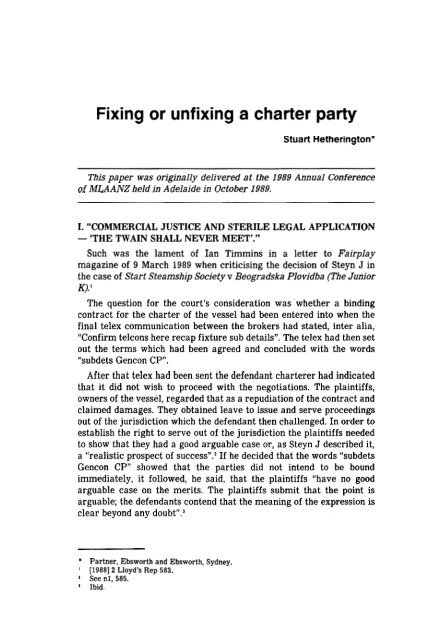
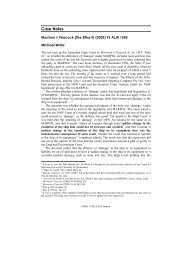
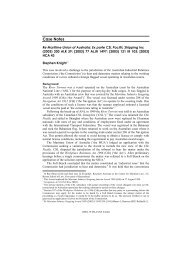
![[2002] 3 NZLR 52](https://img.yumpu.com/19004478/1/184x260/2002-3-nzlr-52.jpg?quality=85)
